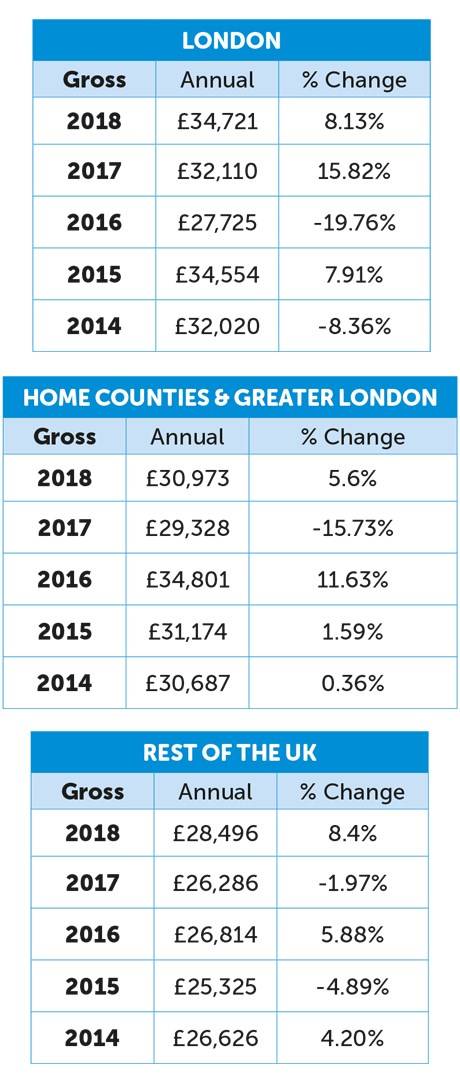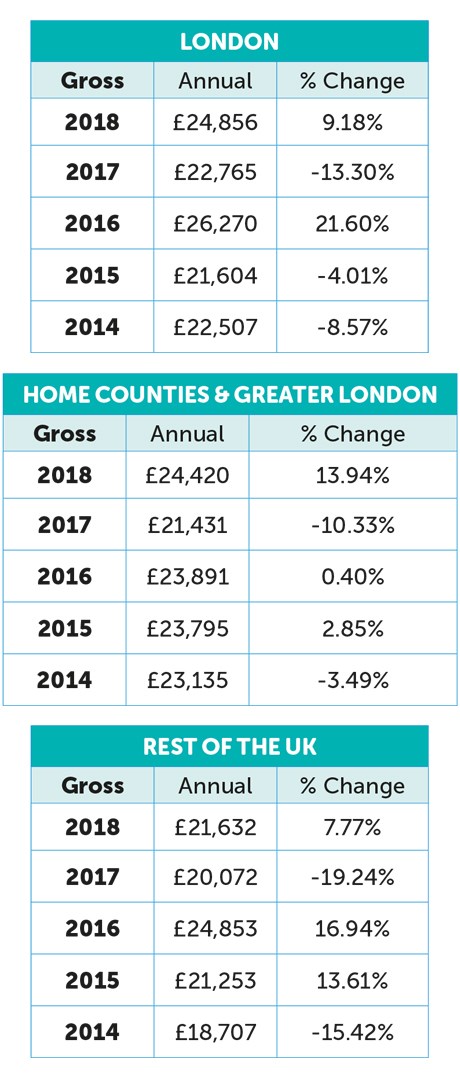Cost of using nannies ‘pushed up by Brexit’
Meredith Jones Russell
Sunday, September 1, 2019
The pressures of Brexit have seen a rise in the cost of UK nannies, according to research.

- Cost of hiring a nanny rises 8 per cent since 2017/18
- Minimum wage and Brexit cited as reasons
The pressures of Brexit have seen a rise in the cost of UK nannies, according to research.
The annual wages report by payroll service Nannytax found the average cost of hiring a nanny has risen by 8 per cent since 2017/18, with the highest rise outside London seen in the South-East of England.
The Nannytax Nanny Salary Index 2018/19 suggests an overall increase in salaries for nannies across the country, with the average gross salary for live-out nannies increasing by 8 per cent, while the average salary for live-in nannies has increased by 9 per cent in London and 8 per cent in the rest of the UK.
The vast majority of nannies in the UK are live-out nannies, according to the research. Just 9 per cent live with the families they work for.
Nannytax said the rise in the minimum wage and the reduction in EU workers as a result of Brexit had pushed up employment costs.
The number of home childcarers has reduced by 12 per cent since August 2015, according to Ofsted.
Other findings from the research included:
- Live-out nannies in London earn an average gross wage of £34,721 per year, an 8.1 per cent increase from 2017, making London the highest-paying region for live-out nannies in the country.
- Live-out nannies in the rest of the UK earn an average gross wage of £28,496 per year, an increase of 8.4 per cent from 2017.
- Live-in nannies working outside of London earn an average gross wage of £21,632, a 7.8 per cent increase from 2017.
- Outside London, the South-East of England is the highest-paid area for live-in nannies, where they earn an average gross wage of £25,376 per year, followed by the East Midlands at £25,324 per year. The North-West is the lowest payer with an average of £21,879, followed by the West Midlands at £23,140 per year.
- Outside London, the South-East is also the highest-paid area for live-out nannies, who earn an average gross wage of £32,370 per year, followed by the East of England at £30,342 and the South-West at £29,926 per year. The lowest payer is in the North-West at £26,296, followed by the North-East at £26,676 per year.
LIVE-OUT NANNIES - AVERAGE GROSS SALARIES IN THE LAST 5 YEARS

Live-out nannies’ salaries have risen across most regions since 2017/18, with Scotland and the South-East both seeing a rise of 17 per cent. The only exception is in the North-West where salaries have reduced by 9 per cent, although this brings the region’s nannies back to what was the UK average salary in previous years before the rise in 2018/19.
Kirsty Wild, head of sales and marketing at Nannytax, said, ‘With childcare costs at an all-time high, choosing a nanny is not the cheapest option for working parents, but hiring a qualified professional brings many rewards and individual care. With this expertise comes higher costs and salaries have also risen amid a Brexit-fuelled skills shortage.
‘This rise in wages is of course good news for those nannies in employment but is another financial burden for working parents during a time of economic uncertainty.’
Tricia Pritchard, managing director of BAPN, the membership association for professional nannies, said the organisation welcomed the results of the report.
‘It’s always good news to see the average nanny salary has increased. However, it remains frustrating to us that outside of London, the average salary for a nanny is just a little over the minimum wage, doesn’t reflect the importance of the role, and nannies are having to work unacceptable long hours to take home a salary they can live on.
‘The report demonstrates, again that there’s a long way to go before nanny salaries catch up with the rest of the early years workforce.’
LIVE-IN NANNIES - AVERAGE GROSS SALARIES IN THE LAST 5 YEARS

CASE STUDY
 Nick Mitchell is a nanny from West Surrey. He has worked in childcare since 1992 and as a full-time live-out nanny since 2004. He is currently job-hunting.
Nick Mitchell is a nanny from West Surrey. He has worked in childcare since 1992 and as a full-time live-out nanny since 2004. He is currently job-hunting.
Mr Mitchell said the results of the Nannytax salary index are ‘pretty reflective’ of his experience.
‘I like that the statistics show gross wages rather than net,’ he said. ‘The only issue is that calculating an average doesn’t allow for the range of wages to be shown. The figures for areas around London, for example, could be skewed because London is so different that it throws everything out.
‘Surrey is problematic because some areas are near London and some are more rural. In my area, the research shows an average wage of £13.25 per hour, but that’s not what I get. In my last job I earned £11.50 an hour.
‘However, the figure for the South-East as a whole is £12.45 per hour and that matches pretty well with my experience, and the jobs I am currently interviewing for.’
Mr Mitchell said the rise in salaries found in the survey was surprising, however.
‘I have seen a rise in wages over time, but not that much. In 2008 I was making £10.84 per hour, so it’s not gone up much in ten years [6.1 per cent], not even in line with inflation. I’ve come to a point in my career where it almost feels like I’ve maxed out.
‘Experience doesn’t seem to make much of a difference any more, as people with two years’ and 20 years’ experience are getting about the same amount. It’s all based purely on what parents can afford to pay.’
Mr Mitchell also expressed surprise at Ofsted figures suggesting there were fewer registered nannies working, but offered a possible explanation for the perceived growth in competition for nanny jobs.
‘I wouldn’t say I have noticed falling numbers of nannies,’ he said. ‘In fact, while 10 years ago I was often the only nanny applying for roles, now I am often one of 20. There is a lot more competition. Maybe there are fewer parents looking for nannies now, though. Certainly a lot of parents are looking for before- and after-school care, but not necessarily all day.
‘I think the 30 hours is affecting this. I was made redundant from my last job after the younger child turned three and was going to be spending much more time at nursery.’




